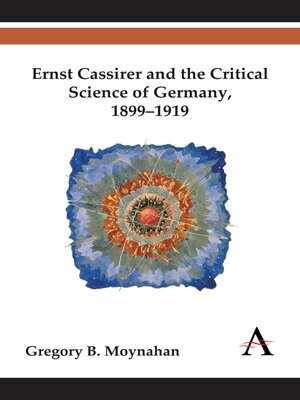Ernst Cassirer and the Critical Science of Germany, 1899–1919
ebook ∣ Key Issues In Modern Sociology
By Gregory B. Moynahan

Sign up to save your library
With an OverDrive account, you can save your favorite libraries for at-a-glance information about availability. Find out more about OverDrive accounts.
Find this title in Libby, the library reading app by OverDrive.



Search for a digital library with this title
Title found at these libraries:
| Library Name | Distance |
|---|---|
| Loading... |
Recovering a lost world of the politics of science in Imperial Germany, Gregory B. Moynahan approaches the life and work of the philosopher and historian Ernst Cassirer (1874–1945) from a revisionist perspective, using this framework to redefine the origins of twentieth-century critical historicism and critical theory. The only text in English to focus on the first half of the polymath Cassirer's career and his role in the Marburg School, this volume illuminates one of the most important – and in English, least-studied – reform movements in Imperial Germany.
|Recovering a lost world of the politics of science in Imperial Germany, Gregory B. Moynahan revisits the work of the philosopher and historian Ernst Cassirer (1874–1945) and explores his relations with the Marburg School of Hermann Cohen. "Ernst Cassirer and the Critical Science of Germany, 1899–1919" covers the epochal transformations of the natural sciences at the turn of the century, and reveals Cassirer's view of an emergent mode of understanding based purely on relational structure which, he perceived, could be applied fruitfully to the social sciences and humanities, or human sciences, "Geisteswissenschaften."
Moynahan relates that the result was a permanently fluid but rule-based definition of the permutation of objects and subjects, as well as knowledge and reality, within different fields of knowledge. Cassirer's project placed the development of the sciences, "Wissenschaften," within a wide historical and ethical ambit, and sought to establish a new definition of experience, society and modernity; this project, Cassirer argued, was pivotal to the future of Germany. On this basis, Moynahan posits that Cassirer's early work furthered the foundation of a distinctly Central European argument for democracy, liberalism and civil rights. [NP] Moynahan defends Cassirer's critique as formative in the origins of twentieth-century social sciences, philosophy of science and law, and he argues for its direct relevance to a generation of scholars before the Second World War (including Elias, Kelsen and Panofsky), as well as after (such as Blumenberg, Foucault and Luhmann). The only text in English to focus on the first half of the polymath Cassirer's career, this work illuminates one of the most important – and in English, least-studied – reform movements in Imperial Germany.







